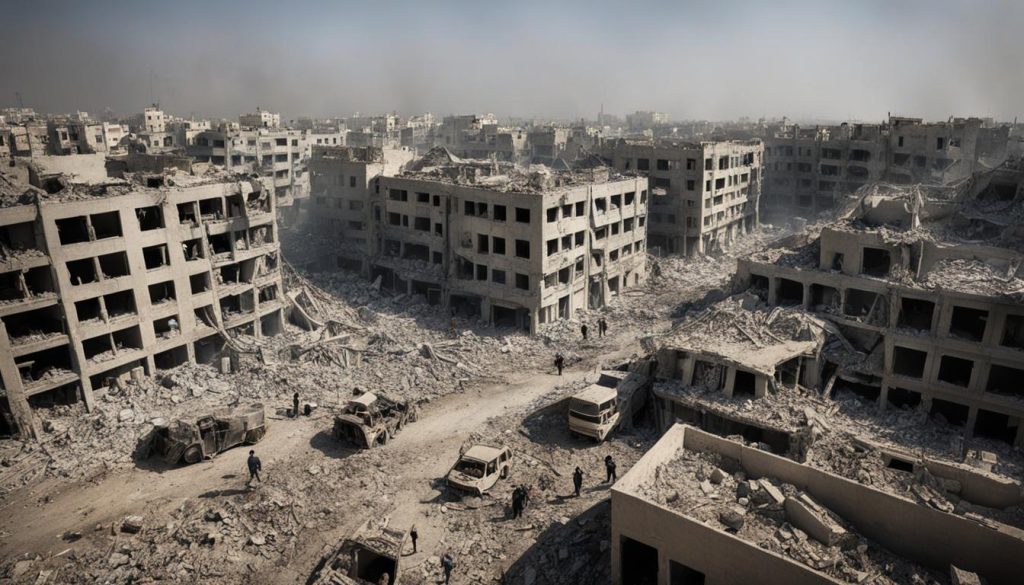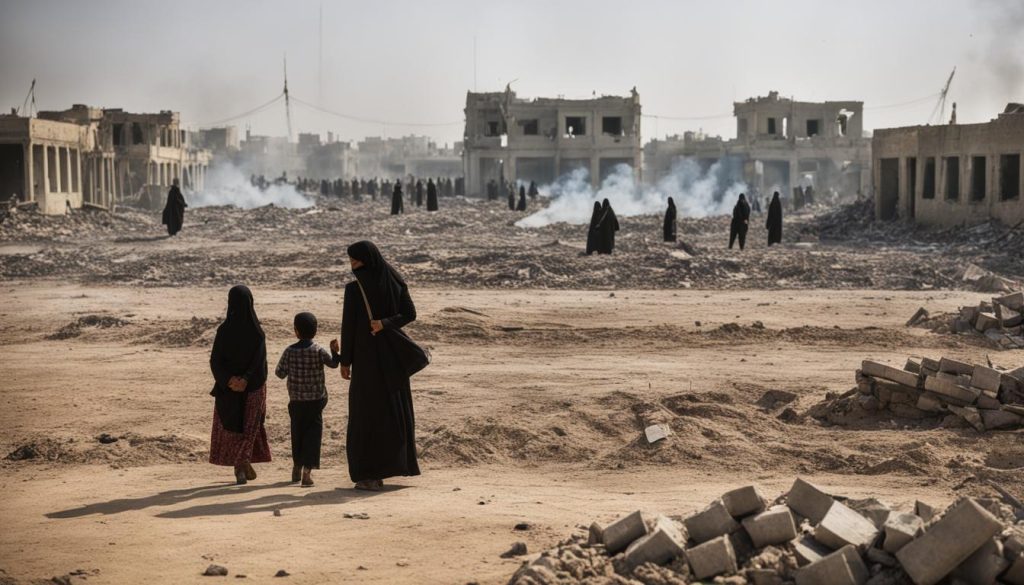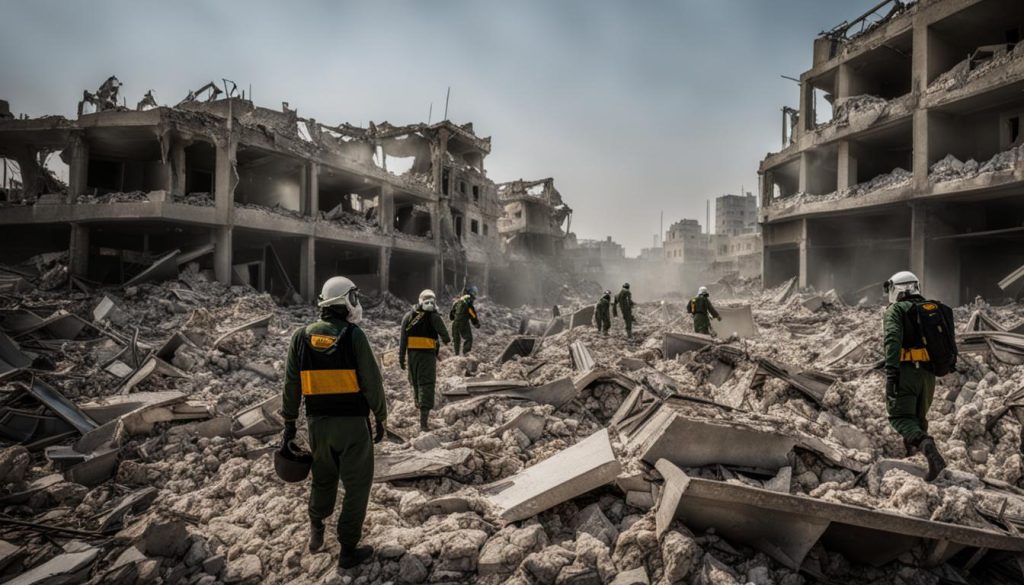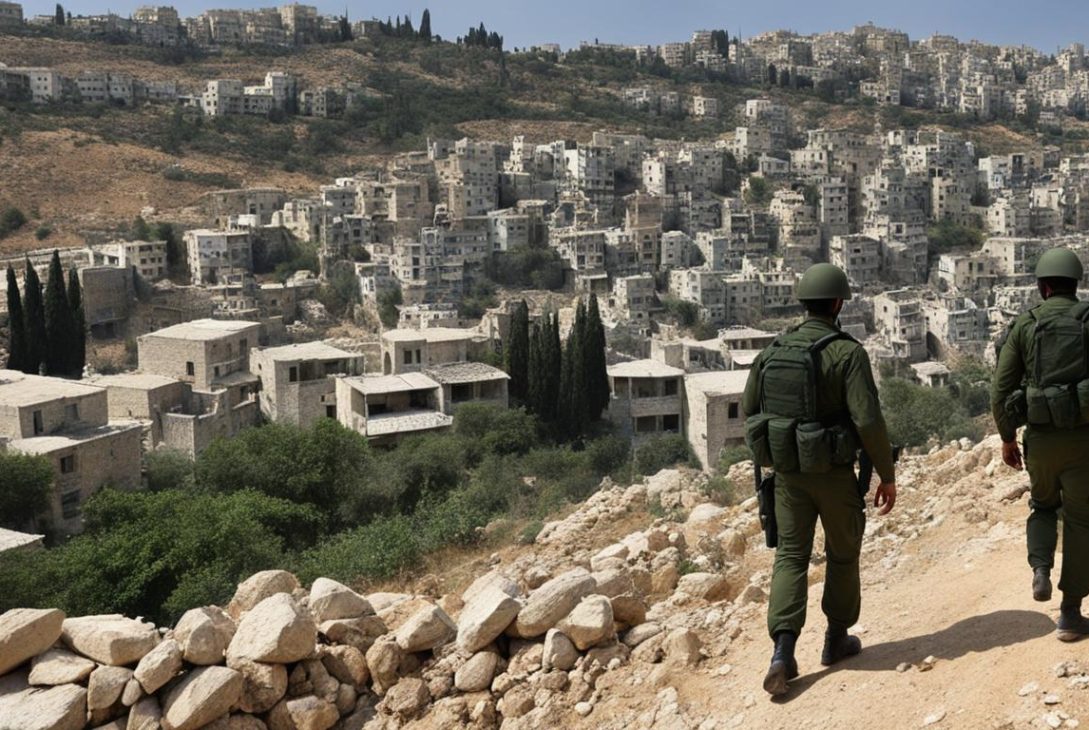A senior Hamas leader, Saleh al-Arouri, has been killed in a drone strike in a suburb of Beirut, according to sources. The Israeli Defense Forces (IDF) have not taken responsibility for the attack. The Lebanese Prime Minister has accused Israel of attempting to escalate the conflict and bring Lebanon into a new phase of confrontations. In response, the IDF has announced its plans to begin withdrawing troops from the region in the coming days.
Key Takeaways:
- Senior Hamas leader Saleh al-Arouri was killed in a drone strike in a suburb of Beirut.
- The IDF has not claimed responsibility for the attack.
- The Lebanese Prime Minister accuses Israel of attempting to escalate the conflict.
- The IDF plans to withdraw troops in the coming days.
Conflicting Statements on Responsibility for the Strike
As news broke about the drone strike that killed senior Hamas leader Saleh al-Arouri in Lebanon, conflicting statements regarding the responsibility for the strike began to emerge. While the Israeli Prime Minister’s advisor refrained from confirming or denying Israel’s involvement, he emphasized that the strike specifically targeted Hamas and was not intended as an attack on Lebanon.
The Lebanese Prime Minister, on the other hand, wasted no time in blaming Israel for the strike, accusing them of attempting to escalate the conflict and bring Lebanon into a new phase of confrontations. Hamas also directed blame towards Israel, condemning the strike and holding them responsible for the assassination of their senior leader.
Amidst the conflicting narratives, the Israeli Defense Forces (IDF) have yet to comment on the incident, leaving the question of responsibility unanswered and fueling speculation about the true culprits behind the strike.
Statements from Relevant Figures:
“The strike was a targeted attack on Hamas, not Lebanon. It is essential to differentiate between the two.”
“Israel’s attempt to escalate the conflict by targeting Hamas is a violation of Lebanon’s sovereignty and a dangerous provocation.”
“This strike is an act of aggression by Israel and a cowardly assassination of our esteemed leader. We hold them fully responsible for this heinous crime.”
As the conflicting statements continue to circulate, the ambiguity surrounding the responsibility for the strike adds to the complexity of the Israel-Hamas conflict and the broader regional tensions in the Middle East.
| Different Perspectives on Responsibility for the Strike | ||
|---|---|---|
| Stakeholder | Statement | Position |
| Israeli Prime Minister’s Advisor | “The strike targeted Hamas, not Lebanon.” | Israel denies responsibility |
| Lebanese Prime Minister | “Israel’s attempt to escalate the conflict is a violation of Lebanon’s sovereignty.” | Blames Israel for the strike |
| Hamas Spokesperson | “This strike is an act of aggression by Israel and a cowardly assassination of our esteemed leader.” | Holds Israel fully responsible |
Potential Implications of the Strike
The killing of a senior Hamas leader in Lebanon has significant potential implications for the ongoing Israel-Hamas conflict and the broader Middle East conflict. The assassination of Saleh al-Arouri has ignited concerns about escalating tensions and the possibility of a two-front war for Israel.
Hezbollah, the Iran-aligned Lebanese militant group, has issued a strong warning, vowing to respond to the attack. This raises the alarming prospect of further violence and retaliation in the region.
The international community is closely watching the developments, recognizing the potential for this single strike to aggravate an already volatile situation. The Israel-Hamas conflict has long-lasting ramifications, not only for the parties involved but also for the broader Middle East dynamics.
“The killing of the senior Hamas leader has triggered precarious circumstances in the region. With Hezbollah’s threats of retaliation, the situation is on the verge of exploding into a more substantial conflict.” – Analyst from the Middle East Forum
As the conflict intensifies, so does the concern for civilian casualties and displacement. The Israel-Palestine conflict has a long history, and every event has far-reaching consequences that affect the lives of countless individuals. The imperative to find a resolution and achieve stability in the region is more pressing than ever.
Regional Ramifications of the Killing
| Implication | Analysis |
|---|---|
| Potential Two-Front War | The strike raises the possibility of Israel facing hostilities from both Hamas in the Gaza Strip and Hezbollah in Lebanon simultaneously. This would significantly escalate the conflict and pose a severe challenge to Israel’s military capabilities. |
| Increased Regional Tensions | Hezbollah’s strong response to the assassination puts additional strain on the already volatile Middle Eastern region. The potential for further violence and retaliation is a cause for concern among neighboring countries and the international community. |
| Further Destabilization | The killing of a senior Hamas leader adds another layer of instability to the conflict. This event has the potential to trigger a series of actions and reactions that can spiral into a deeper crisis with unpredictable outcomes. |
| International Intervention | The intensification of the Israel-Hamas conflict and the threat of a broader regional entanglement could prompt increased international involvement. Diplomatic efforts, mediation, and calls for a ceasefire may gain momentum to prevent further escalation. |

Israel’s Plans for a Post-Hamas Gaza
The Israeli government is discussing plans for a post-Hamas Gaza that prioritize stability and security in the region. They are considering a unique approach by involving local Gazan clans in the administration of the enclave, instead of relying on the Palestinian Authority. These clans would be responsible for addressing the civilian needs and providing humanitarian aid in specific areas, while Israel would establish a temporary security zone on Gaza’s perimeter.
The goal of these plans is to prevent Hamas from regaining control over Gaza and ensure a smooth transition to a more secure and stable future. By involving local clans, the Israeli government aims to empower the Gaza community to take ownership of their own governance and contribute to rebuilding efforts.
This approach also acknowledges the complexities of the situation in Gaza and recognizes the need for a multifaceted approach to ensure sustained stability. By creating a temporary security zone, Israel aims to uphold its commitment to protecting its borders while allowing for the potential for future diplomatic resolutions.
These plans have significant implications for the Israel Defense Forces (IDF), as they will play a crucial role in implementing and maintaining the temporary security zone. It also signals Israel’s commitment to finding a long-term solution to the Israel-Hamas conflict that prioritizes the well-being and security of both Israeli and Gazan populations.
Gazan Clans in Administration
The involvement of local Gazan clans in the administration of the enclave brings a unique perspective to governance in Gaza. These clans have deep-rooted ties within the local community and possess an inherent understanding of the needs and dynamics of the region. By leveraging their intimate knowledge and relationships, the Israeli government aims to create a more localized and responsive governance structure.
Temporary Security Zone
The establishment of a temporary security zone on Gaza’s perimeter by the IDF is a significant component of the plan. This zone will serve as a buffer between Gaza and Israel, ensuring the security of Israeli citizens while allowing for a controlled transition period. It will allow the IDF to maintain a presence and monitor potential security threats, mitigating the risk of Hamas reasserting control and jeopardizing the stability of the region.
| Benefits of Israel’s Plans | Considerations |
|---|---|
| • Empowering local Gazan clans in the administration | • Ensuring smooth transition and stability |
| • Creating a temporary security zone for border protection | • Allowing for potential diplomatic resolutions |
| • Building a more localized and responsive governance structure | • Monitoring and mitigating security threats |
The Israeli government’s plans for a post-Hamas Gaza reflect a comprehensive approach that recognizes the need for stability, security, and local participation in the region’s governance. By involving Gazan clans and establishing a temporary security zone, Israel aims to prevent Hamas from regaining control and pave the way for a more peaceful future. These plans demonstrate Israel’s commitment to finding long-term solutions to the Israel-Hamas conflict while prioritizing the well-being of all parties involved.
Milestones in the Israel-Hamas Conflict
The Israel-Hamas conflict has been marked by several significant milestones, showcasing the ongoing tensions between the two parties. One of the latest events in this series is the killing of a Hamas leader in Lebanon, adding another layer to the complex dynamics between Israel and Hamas.
Throughout the conflict, the Israel Defense Forces (IDF) have been actively engaged in conducting airstrikes and ground operations in the Gaza Strip. Their primary targets have been Hamas infrastructure and military operatives, aiming to disrupt and dismantle the group’s capabilities.
Moreover, the conflict has extended beyond the boundaries of the Gaza Strip, with Hamas launching attacks in Lebanon. These attacks have resulted in exchanges of fire along the border, further exacerbating the already tense situation in the region.
“The killing of a Hamas leader in Lebanon and the IDF’s operations in Gaza highlight the ongoing intensity of the Israel-Hamas conflict, with significant consequences for both parties involved.”
As the conflict evolves, it is essential to closely monitor the milestones and events that shape its trajectory. Understanding these developments provides valuable insights into the dynamics and implications of the Israel-Hamas conflict.
| Date | Event |
|---|---|
| Month, Year | Israel-Hamas conflict escalates with increased rocket attacks |
| Month, Year | IDF launches airstrikes targeting Hamas infrastructure in the Gaza Strip |
| Month, Year | Hamas resumes attacks in Lebanon, resulting in border clashes |
| Month, Year | IDF conducts ground operations in Gaza, targeting Hamas military operatives |
| Month, Year | Hamas leader killed in a drone strike in Lebanon |
Each milestone in the Israel-Hamas conflict adds a layer of complexity to the situation. As the conflict continues to unfold, it remains crucial for all parties involved, as well as the international community, to seek avenues for dialogue and de-escalation in order to achieve lasting peace and stability in the region.
International Response and Calls for Ceasefire
The international community has strongly urged a ceasefire in the ongoing Israel-Hamas conflict to alleviate the escalating humanitarian crisis. Prominent nations and organizations have expressed concern about the plight of civilians and the need for stability in the region.
The United States, playing a key role in the peace process, has been engaging in constructive discussions with Israeli officials to chart a path forward for Gaza after the conflict. Efforts are focused on ensuring stability and facilitating the delivery of vital humanitarian assistance to address the urgent needs of the affected population.
The United Nations has also called for an immediate cessation of hostilities, emphasizing the need to protect the civilian population and prevent further displacement. The organization is deeply concerned about the humanitarian impact of the conflict and is working tirelessly to coordinate relief efforts.
UNICEF, the United Nations agency for children, has been working on the ground to provide aid to Gaza. They have successfully delivered vaccines to help combat the spread of diseases. However, the situation demands more comprehensive support and urgent action to address the pressing challenges faced by the people of Gaza.
The international community recognizes the urgency of the situation and continues to call for an immediate ceasefire to prevent further loss of life and alleviate the suffering of innocent civilians caught in the crossfire. Efforts are underway to engage all parties involved in the conflict and work towards a peaceful resolution.
Assassination of Hamas Leader and Regional Implications
The recent assassination of a senior Hamas leader in Lebanon has sent shockwaves throughout the region, with potential ramifications that extend beyond the borders of the two nations involved. Hamas, a prominent Palestinian militant group, and Hezbollah, a powerful Lebanese political and military organization, both play significant roles in the volatile Middle East landscape. The escalating tension between these two factions has the potential for far-reaching consequences.
Hezbollah, known for its strong ties to Iran, has pledged to retaliate against the killing of the Hamas leader. This vow raises concerns about the potential escalation of hostilities between Hamas and Hezbollah, which could further ignite the ongoing Israel-Hamas conflict in the region.
“Iran strongly condemns the assassination of the Hamas leader and expresses its full support for Hamas in this trying time,” stated an Iranian government spokesperson. This declaration of support further underscores the geopolitical stakes and the potential for wider regional involvement.
Given the fluidity of the situation, concerns are mounting about the possibility of retaliation from various actors and the consequent escalation of violence in an already turbulent region.

Israeli Motives and Strategy in Targeting Hamas Leaders
The Israeli government has undertaken a determined campaign to target Hamas leaders as part of a strategic assassination campaign. By eliminating key figures within the organization, such as the recent killing of Saleh al-Arouri, Israel aims to weaken Hamas and disrupt its operations.
Israeli officials firmly believe that by specifically targeting Hamas leaders, they can deter future attacks and destabilize the group. The rationale behind this strategy is to create internal disarray within the organization and diminish its capabilities. By removing influential leaders, Israel aims to instill fear and uncertainty among the remaining members of Hamas, thus reducing their ability to plan and execute attacks against Israeli targets.
However, it is important to note that such actions may have unintended consequences and pose risks for potential escalation of tensions in the region. Targeting Hamas leaders may prompt retaliatory actions from the group or its affiliates, fueling further violence and perpetuating the cycle of conflict.
Despite perceived risks, the Israeli government remains steadfast in its commitment to this strategy. The assassination campaign is viewed as an effective tool to not only disrupt Hamas but also send a clear message that Israel will not tolerate threats to its security. The government hopes that by targeting Hamas leaders, it can weaken the organization’s structure, reduce its operational capabilities, and ultimately enhance Israeli security.
While the effectiveness and long-term impact of Israel’s assassination campaign against Hamas leaders are subject to debate, it is evident that the government is pursuing this strategy with determination. As the conflict between Israel and Hamas continues, the targeting of leaders remains a central pillar of Israel’s approach.
Whether this strategy ultimately achieves its desired goals or further exacerbates the tensions in the region, only time will tell.
Image: The image represents the complex and delicate nature of the Israeli government’s strategy in targeting Hamas leaders.
Public Perception and Support for the Israeli Government
The Israeli government’s actions in the Israel-Hamas war have elicited diverse opinions among the public. While some individuals believe that the targeted elimination of Hamas leaders is a necessary measure to safeguard Israeli security and prevent future attacks, others express apprehension regarding potential civilian casualties and the impact on regional stability. The ongoing conflict and its aftermath are expected to significantly influence public opinion and shape the level of support for the government.

“The Israeli government’s actions are paramount to ensuring the safety and wellbeing of our country. By targeting Hamas leaders, they are taking proactive steps to dismantle a terrorist organization that poses a constant threat to our citizens.” – Aviv Cohen, Tel Aviv resident
“While I understand the need to protect Israeli security, I am concerned about the potential for civilian casualties and the long-lasting consequences of this conflict. It is crucial that we strive for a peaceful resolution that upholds human rights and minimizes harm to innocent people.” – Sarah Levy, Haifa resident
Public Opinion: Diverse Perspectives
Public opinion regarding the Israeli government’s actions in the Israel-Hamas war is multifaceted. The complexity of the conflict, the historical context, and individual perspectives contribute to diverse viewpoints.
- Some individuals firmly support the government’s efforts, viewing the targeted elimination of Hamas leaders as a necessary means of ensuring national security.
- Others, however, express concerns about the potential for civilian casualties, emphasizing the importance of protecting innocent lives and prioritizing diplomacy.
- There are also those who advocate for a more nuanced approach, recognizing the need for security while advocating for a comprehensive peace process that addresses the underlying issues fueling the conflict.
Support for the Government: Balancing Security and Humanitarian Concerns
The ongoing Israel-Hamas war has prompted discussions about the delicate balance between national security and humanitarian considerations. The Israeli government faces the challenge of effectively addressing the immediate threat posed by Hamas while minimizing harm to civilians and working towards long-term stability in the region.
| Perspective | Support for the Government |
|---|---|
| Focus on Security | Emphasizes the government’s responsibility to protect Israeli citizens from terrorist threats and sees targeted elimination of Hamas leaders as a critical strategy. |
| Humanitarian Concerns | Stresses the importance of minimizing civilian casualties, advocating for efforts to ensure humanitarian aid reaches affected populations, and prioritizing diplomatic solutions. |
| Comprehensive Approach | Acknowledges the complexity of the conflict and supports a balanced approach that addresses security concerns while actively working towards a comprehensive resolution for lasting peace. |
The Israeli government recognizes the need to navigate these competing interests and maintain international support while prioritizing the safety and welfare of its citizens.
Potential Legal Consequences and International Pressure
Amidst the ongoing Israel-Hamas conflict and the complexities of the Israel-Palestine conflict, a new development has emerged: South Africa has filed a case at the International Court of Justice (ICJ) accusing Israel of genocide against the Palestinians.
Israel, on the other hand, has categorically pledged to defend itself against these grave allegations, denouncing the case as an “absurd blood libel.” The Israeli government emphasizes that its actions are in the interest of national security and self-defense.
This legal case shines a spotlight on the international pressure mounting on Israel to address the longstanding Israel-Palestine conflict and find a viable and lasting resolution. The implications of this court case stretch far beyond the boundaries of the Middle East, as it further fuels debates and discussions surrounding the complexities of the conflict.
The outcome of the case and the subsequent legal consequences, as well as the diplomatic implications, remain uncertain. However, this legal battle exemplifies the extent of the international community’s interest in seeking justice and ensuring accountability for all parties involved.
This legal case shines a spotlight on the international pressure mounting on Israel to address the longstanding Israel-Palestine conflict and find a viable and lasting resolution.
International Court of Justice (ICJ)
The International Court of Justice (ICJ), also known as the World Court, is the principal judicial body of the United Nations. It is located in The Hague, Netherlands. The ICJ’s primary purpose is to settle legal disputes between states and provide advisory opinions on legal questions referred to it by authorized United Nations organs and specialized agencies.
South Africa’s Case against Israel
South Africa’s decision to file a case against Israel at the ICJ has significant implications for the Israel-Palestine conflict. South Africa accuses Israel of committing genocide against the Palestinian people, a grave allegation that adds fuel to the ongoing debate surrounding the conflict.
This case raises important legal and ethical questions regarding the treatment of Palestinians and the responsibility of the international community in addressing human rights violations. The outcome of the case will undoubtedly influence future discussions and actions pertaining to the Israel-Palestine conflict.
It is worth noting that this is not the first time the ICJ has addressed the Israel-Palestine conflict. In 2004, the court issued an advisory opinion stating that the construction of the Israeli West Bank barrier violated international law.
Diplomatic Implications and Global Attention
The South Africa case and the broader Israel-Palestine conflict have garnered significant attention on the international stage. The legal proceedings and their outcome will have diplomatic implications, potentially shaping future policies and actions of nations towards Israel and the Palestinian territories.
This case adds to the ongoing calls from the international community for a peaceful resolution to the Israel-Palestine conflict, emphasizing the need for dialogue, negotiation, and respect for international law. The ICJ proceedings will undoubtedly fuel discussions surrounding the rights and responsibilities of nations in addressing conflicts and human rights issues worldwide.
Conclusion
The Israel-Hamas war, marked by the recent killing of a senior Hamas leader and the planned withdrawal of IDF troops, continues to unfold with uncertain outcomes. The region remains on edge as further escalations and potential consequences loom. The international community is closely monitoring the situation, urging for an immediate ceasefire to prevent further bloodshed and destruction.
As the conflict winds down, the focus shifts to the aftermath and the need for a comprehensive approach. Ensuring stability, security, and humanitarian aid for the affected populations will be crucial. The withdrawal of IDF forces presents an opportunity for all parties to engage in dialogue and lay the foundation for a lasting peace.
The Middle East conflict has long been a complex issue with deep-rooted historical and geopolitical factors. It demands a nuanced understanding and concerted efforts from all stakeholders to address the underlying causes and work towards a sustainable resolution. The international community must play a proactive role in facilitating negotiations and supporting initiatives that promote lasting peace.
With the world’s attention fixed on the Israel-Hamas war live updates, it is essential to recognize that the consequences of this conflict extend far beyond the immediate region. The stability and security of the Middle East have implications for global peace and security. It is incumbent upon all nations to contribute constructively towards a peaceful resolution, fostering stability and prosperity for generations to come.
FAQ
What happened to the senior Hamas leader in Lebanon?
According to sources, Saleh al-Arouri was killed in a drone strike in a suburb of Beirut.
Who is responsible for the attack?
The Israeli Defense Forces (IDF) have not claimed responsibility for the attack.
What are the conflicting statements regarding the responsibility for the strike?
The Israeli Prime Minister’s advisor did not confirm or deny Israel’s involvement, while the Lebanese Prime Minister and Hamas blamed Israel for the strike. The IDF has not commented on it.
What are the potential implications of the strike?
The killing of a Hamas leader in Lebanon has potential implications for the ongoing Israel-Hamas conflict and the broader Middle East conflict, including the possibility of a two-front war for Israel.
What are Israel’s plans for a post-Hamas Gaza?
The Israeli government is considering involving local Gazan clans in the administration of the enclave, while Israel would set up a temporary security zone on Gaza’s perimeter to prevent Hamas from regaining control and ensure stability.
What are the milestones in the Israel-Hamas conflict?
The conflict has included airstrikes and ground operations by the IDF in the Gaza Strip, attacks by Hamas in Lebanon, and exchanges of fire along the border.
What is the international response and calls for a ceasefire?
The international community has called for a ceasefire, with the United States in constructive discussions, and the United Nations expressing concern about the impact on the civilian population in Gaza.
What are the regional implications of the Hamas leader’s assassination?
The assassination has potential regional implications, with concerns about escalation between Hezbollah and Hamas, and support from Iran for Hamas.
What are Israel’s motives and strategy in targeting Hamas leaders?
Israeli officials believe that targeting Hamas leaders will deter future attacks and destabilize the group, but there are concerns about unintended consequences and escalating tensions.
What is the public perception and support for the Israeli government?
Public opinion varies, with some viewing the targeting of Hamas leaders as necessary for security, while others express concerns about civilian casualties and regional stability.
What are the potential legal consequences and international pressure?
South Africa has filed a case at the International Court of Justice accusing Israel of genocide, highlighting international pressure to address the Israel-Palestine conflict and find a resolution.
What is the latest update on the Israel-Hamas war?
The IDF is withdrawing troops in the coming days, and the situation remains volatile with potential for further escalations and regional implications.
Israel-Hamas War Updates: Hamas leader killed in Lebanon; IDF withdrawing
Last modified: January 17, 2024





